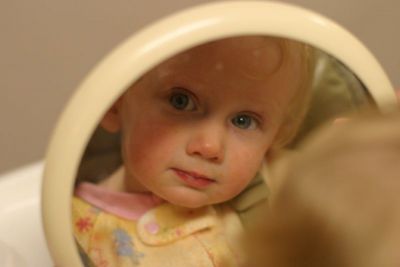Put baby in front of a mirror so they can begin observing themselves.
Materials Needed:
- A mirror (a hand held mirror is sufficient for this game) OR a mirror attached to the wall.
What to do:
- Place baby, in front of the mirror (you may have to sit and support baby or place pillows around baby for extra support while sitting).
- Knock on the mirror to gain baby’s attention.
- As baby looks in the mirror describe what baby is seeing. “That’s you, that me in the mirror”.
- While in front of the mirror point to baby’s facial features and name them “here is your nose, here are your eyes” etc.
- When looking at baby through the mirror make funny faces and observe how baby responds.
- Baby will begin to observe their own expressions while looking at the mirror.
Hints and Tips:
- Watch your baby when they begin to explore themselves in front of the mirror.
- Take videos/photos to record their first experience of seeing themselves.
- Place a mirror in baby’s play area. If using, a mirror attached to the wall make sure that it is secured properly.
